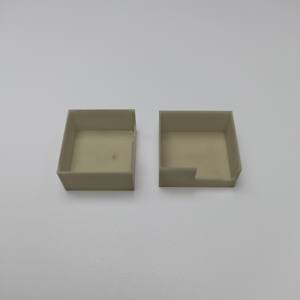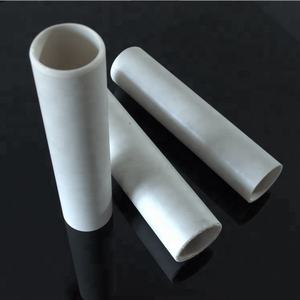Discover Premium Ceramic Products | Durability & Elegance United | Advanced Ceramics
PRODUCT PARAMETERS
Description
Overview of aluminum nitride ceramics
Aluminum Nitride Ceramic is an advanced ceramic material with aluminum nitride as the main component. It has been widely used in electronics, optics, and mechanics due to its unique properties.
Features of aluminum nitride ceramics
High thermal conductivity: Aluminum nitride ceramics have relatively high thermal conductivity, usually between 170-260 W/m·K, which makes it an excellent heat dissipation material. It is especially suitable for electronic devices that require efficient heat dissipation, such as substrate materials for power semiconductor devices.
Good electrical insulation: Despite its high thermal conductivity, aluminum nitride ceramics are excellent insulators of electricity, which can effectively prevent current leakage and ensure the safe operation of electronic components.
Low dielectric constant and dielectric loss: These characteristics make aluminum nitride ceramics very suitable for use in high-frequency circuits because it can reduce energy loss during signal transmission.
High temperature resistance: Aluminum nitride ceramics can maintain structural stability and strength at extremely high temperatures. Its melting point is about 2800°C, so it is suitable for applications in high temperature environments.
Low thermal expansion coefficient: Compared with semiconductor materials such as silicon, aluminum nitride has a lower thermal expansion coefficient, which means it has better dimensional stability when the temperature changes, which helps improve packaging reliability.
Corrosion resistance: Aluminum nitride ceramics have good chemical stability to most molten metals and are not easily oxidized or corroded, allowing them to perform well in harsh environments.
High mechanical strength: Although not as hard as some other types of ceramic materials, aluminum nitride ceramics still provide enough mechanical strength to allow them to be used in many structural applications.
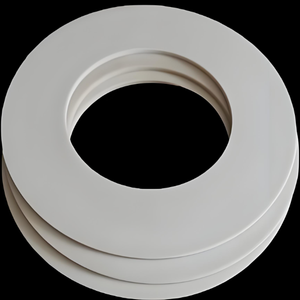
(Electrical Insulation Aluminum Nitride AlN Ceramic Substrate With Surface Polishing)
Specifications of Electrical Insulation Aluminum Nitride AlN Ceramic Substrate With Surface Polishing
The Electrical Insulation Light Weight Aluminum Nitride (AlN) Ceramic Substratum with Surface area Sprucing up is created for high-performance electronic applications. This product combines excellent thermal conductivity with strong electric insulation. It works well in environments needing warm dissipation and electric security. The substratum is made of high-purity aluminum nitride. This makes sure minimal impurities and regular efficiency. Surface area sprucing up enhances its monotony and smoothness. This minimizes surface defects and boosts bonding with other elements.
The thermal conductivity of AlN ceramic substrates reaches 170-220 W/m · K. This enables effective warm transfer from digital gadgets. High thermal conductivity prevents overheating in circuits. Electric insulation homes include a dielectric stamina above 15 kV/mm. This protects against current leakage and short circuits. The dielectric constant is low, around 8.8 at 1 MHz. This sustains secure signal transmission in high-frequency applications.
Surface area sprucing up achieves a roughness (Ra) listed below 0.1 μm. A smooth surface guarantees much better attachment for metallization layers. Metallized layers like gold or silver can be made an application for soldering or cable bonding. The substrate operates in temperature levels from -50 ° C to 850 ° C. It resists thermal shock and keeps structural honesty under fast temperature adjustments.
Standard thickness ranges from 0.25 mm to 3.0 mm. Custom dimensions are available for particular requirements. The material has a high flexural strength of 300-400 MPa. This protects against breaking under mechanical anxiety. Chemical security permits resistance to acids, antacid, and corrosive gases. This makes it suitable for harsh industrial atmospheres.
Applications consist of power modules, LED product packaging, RF/microwave devices, and semiconductor equipment. It is used in auto electronic devices for electric vehicle power systems. Aerospace markets rely on it for radar and interaction systems. The refined surface minimizes signal loss in high-frequency circuits.
Modification options include details dimensions, metallization patterns, and opening boring. The substrate satisfies sector requirements for integrity and performance. It is compatible with thin-film and thick-film technologies. Packaging alternatives make certain security throughout shipping and handling.
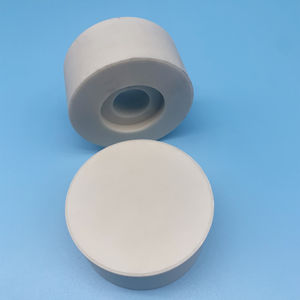
(Electrical Insulation Aluminum Nitride AlN Ceramic Substrate With Surface Polishing)
Applications of Electrical Insulation Aluminum Nitride AlN Ceramic Substrate With Surface Polishing
Electrical insulation aluminum nitride (AlN) ceramic substrate with surface polishing offers important functions in sophisticated markets. This material combines high thermal conductivity with strong electric insulation. Surface area polishing improves performance by developing a smooth, level layer. This enhances heat transfer and minimizes mechanical stress.
AlN ceramic substrates work well in high-power electronic tools. They take care of heat in protected gateway bipolar transistors (IGBTs) and power modules. Reliable warm dissipation protects against overheating. This expands tool life-span. Sleek surfaces make certain tight bonding with metalized layers. This reduces thermal resistance.
The electronics market uses these substratums in LED illumination systems. AlN takes care of high temperatures generated by high-brightness LEDs. Surface sprucing up improves light output uniformity. It likewise reduces thermal development inequalities. This keeps LED frameworks stable under extended operation.
Automotive applications take advantage of AlN substrates. Electric cars count on them for onboard chargers and motor drives. The product withstands high voltages and temperature levels. Sleek surface areas stop micro-cracks. This maintains integrity in extreme environments.
Aerospace and defense sectors utilize AlN for radar systems and microwave gadgets. The ceramic’s low dielectric loss fits high-frequency applications. Surface area sprucing up lowers signal interference. This ensures stable performance in interaction devices.
Medical equipment producers apply AlN substrates in laser diodes and X-ray tubes. The material’s electrical insulation protects against leakage currents. Smooth surface areas help specific element assembly. This is essential for sensitive clinical instruments.
Renewable energy systems like solar inverters use AlN for thermal administration. Refined substratums take care of rapid temperature adjustments. They preserve effectiveness in power conversion procedures.
AlN ceramic substratums with surface area brightening meet needs for miniaturization and high power thickness. Their compatibility with thin-film technologies sustains circuit assimilation. This makes them optimal for portable digital styles.
The material’s resistance to chemical corrosion adds worth in commercial settings. It carries out dependably in humid or reactive atmospheres. Surface polishing more guards versus impurities. This reduces upkeep requirements.
Company Introduction
Advanced Ceramics founded on October 17, 2014, is a high-tech enterprise committed to the research and development, production, processing, sales and technical services of ceramic relative materials and products.. Since its establishment in 2014, the company has been committed to providing customers with the best products and services, and has become a leader in the industry through continuous technological innovation and strict quality management.
Our products includes but not limited to Silicon carbide ceramic products, Boron Carbide Ceramic Products, Boron Nitride Ceramic Products, Silicon Carbide Ceramic Products, Silicon Nitride Ceramic Products, Zirconium Dioxide Ceramic Products, Quartz Products, etc. Please feel free to contact us.(nanotrun@yahoo.com)

Payment Methods
T/T, Western Union, Paypal, Credit Card etc.
Shipment Methods
By air, by sea, by express, as customers request.

5 FAQs of Electrical Insulation Aluminum Nitride AlN Ceramic Substrate With Surface Polishing
What is Aluminum Nitride (AlN) ceramic substrate? Aluminum Nitride ceramic substrate is a material used in electronics for insulation and heat management. It is made from aluminum and nitrogen atoms bonded tightly. This structure gives it high thermal conductivity and electrical insulation. It works well in high-power applications where heat must move away quickly.
Why use Aluminum Nitride for electrical insulation? Aluminum Nitride does not conduct electricity but moves heat efficiently. This makes it better than materials like alumina. Alumina has lower thermal conductivity. AlN keeps devices cool while preventing electrical leaks. This is critical in circuits and power systems where overheating or short circuits cause failures.
What does surface polishing do for AlN substrates? Polishing makes the substrate surface smooth. Rough surfaces trap heat or interfere with circuit layers. A polished surface improves heat transfer and reduces defects. It also helps bond metal layers more evenly. This step ensures better performance in high-precision applications like LEDs or microchips.
Where are polished AlN substrates commonly used? They are used in power electronics, LED lighting, and semiconductor devices. High-power modules need materials that handle heat and electricity safely. Polished AlN substrates fit in laser diodes, radio-frequency systems, and automotive electronics. They suit environments demanding reliability and efficient thermal management.
How should AlN substrates be handled and stored? Handle them carefully to avoid chipping or cracking. Use gloves to prevent oil or dirt from affecting performance. Store in dry conditions to stop moisture absorption. Clean with mild solvents if needed. Follow manufacturer guidelines for temperature limits during installation or use. Proper care extends lifespan and maintains insulation properties.
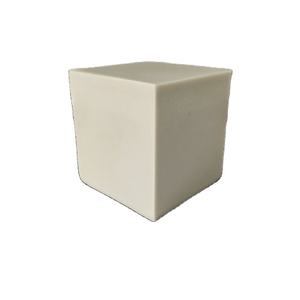
(Electrical Insulation Aluminum Nitride AlN Ceramic Substrate With Surface Polishing)
REQUEST A QUOTE
RELATED PRODUCTS
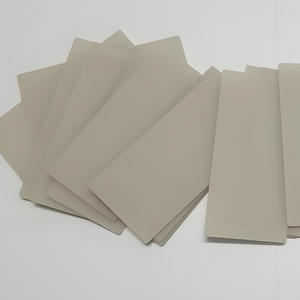
CNC Machining Aluminum Nitride Aln Ceramic Square Crucible Ring/Substrate/Parts
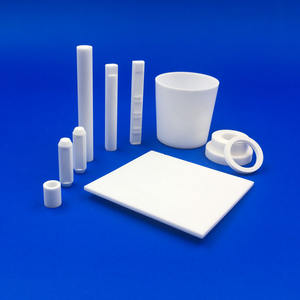
High Quality Thermal Conductive Sheet AlN Aluminum Nitride Ceramic Substrate
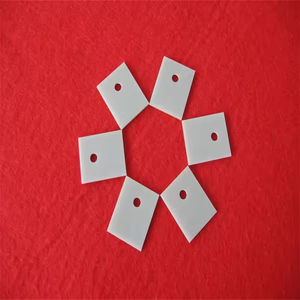
Refractory High Thermal Conductivity Aluminium Nitride Aln Insulating Ceramic Crucible for Electronic
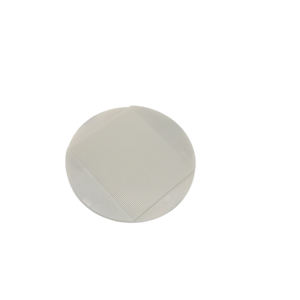
2.5mm Thick Customized Aluminium Nitride/AlN Ceramic Sheet
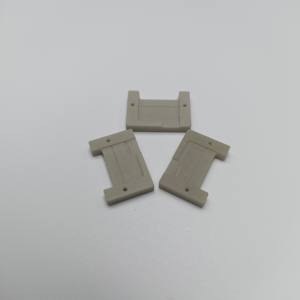
MAX Special Ceramics Material Titanium Aluminum Nitride Ti4AlN3 Powder
